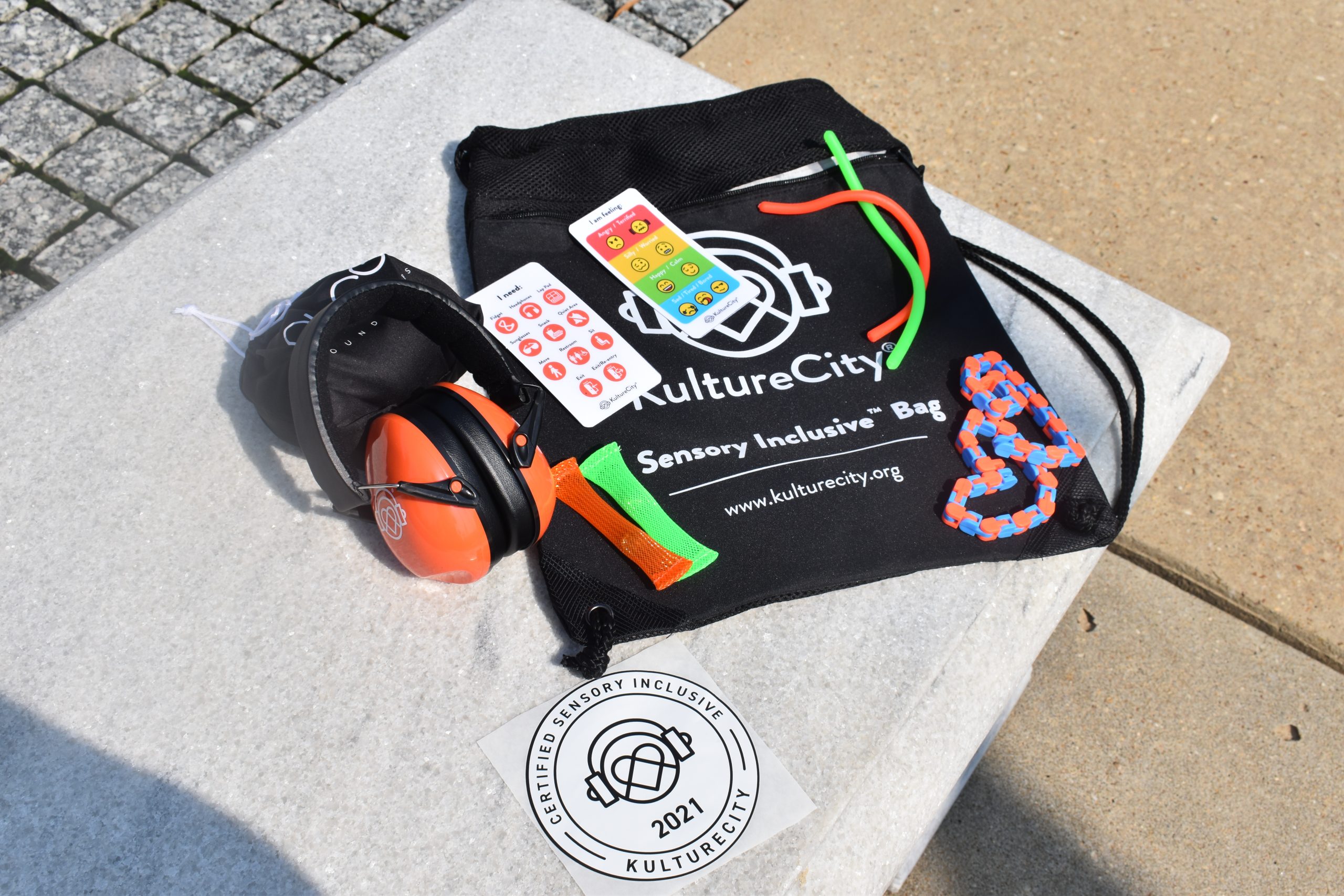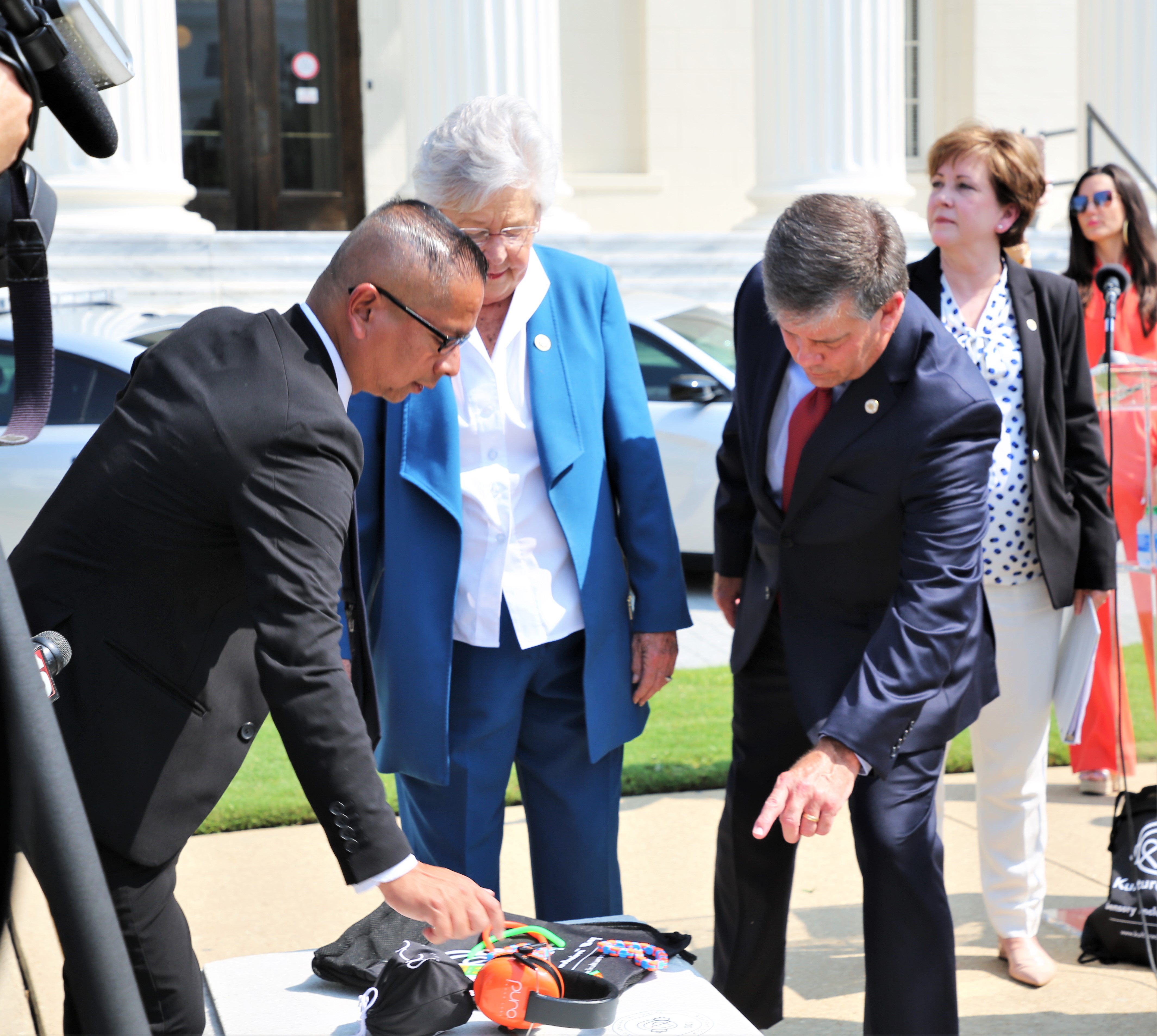Contact Us
To provide feedback on the Community Policing Dispatch, e-mail the editorial board at CPDispatch@usdoj.gov.
To obtain details on COPS Office programs, publications, and resources, contact the COPS Office Response Center at 800-421-6770 or AskCopsRC@usdoj.gov

U.S. Department of Justice
Office of Community Oriented Policing Services
Washington, DC 20530

The Alabama Law Enforcement Agency (ALEA) now has a simple but effective way to respond to individuals who are unable to respond to them: Sensory Bags.
Designed to help individuals who suffer from Sensory Processing Disorder calm themselves, these bags provide a way for officers to interact positively and communicate with people who suffer from this disability and might appear to pose a threat to themselves or others.
Combined with the training that accompanies the bags, ALEA troopers can now readily recognize the symptoms of Sensory Processing Disorder and know how to engage with individuals who are experiencing sensory overload, thereby avoiding a misunderstanding that could escalate a situation.
The First State Law Enforcement Agency to Gain Sensory Inclusive™ First Responder Certification
In 2013, 12 Alabama state law enforcement agencies and functions were consolidated into one entity to create ALEA. The agency now has approximately 1,500 employees in various departments such as Homeland Security, Public Safety, Revenue Enforcement, and Criminal Justice. In 2021, all sworn personnel of the agency, including troopers, special agents with the state bureau of investigation, communication officers, and members of the driver license division, completed Sensory Inclusion training, becoming the first state law enforcement agency to be certified by KultureCity®, a nonprofit organization which specializes in acceptance and accommodation of people with sensory processing and other disabilities.
KultureCity’s training, which is video based, focuses on instilling understanding, acceptance, and empathy in first responders for those with sensory needs, who are estimated to make up between five and 16 percent of the United States population.1
A common symptom of autism, this disability also affects individuals who suffer from post-traumatic stress disorder (PTSD), dementia, or strokes. It is a medical condition in which the brain has trouble receiving and responding to information that comes through the senses, causing them to be over- or under-sensitive to certain things they see, hear, smell, feel, and taste.
Bright lights, street noise, scratchy clothing, and other stimuli can overwhelm those who are hypersensitive, triggering an emotional meltdown and behavior that can appear bizarre, even aggressive. Individuals may seek sensory stimulation through activities such as shouting, flapping their arms, and touching random people, sometimes in a rough manner.
Strategies for Positive Interaction with Sensory Overwhelmed Individuals

Individuals experiencing sensory overload may be so overwhelmed that they are unable to speak or mentally process what they are being told to do. As a result, they may appear to be under the influence of alcohol or drugs, and deliberately uncooperative.
Through KultureCity’s training, ALEA’s officers learned how to help these individuals calm themselves and communicate by modifying the environment—for instance, turning off flashing lights on the squad car—and using the tools in the Sensory Bags, which KultureCity provided to ALEA after completion of agency-wide training and certification.
Every patrol vehicle now contains a bag like the one Trooper Kendra McKinney is showing to a passerby in the photo above. Created to reduce sensory overload in both adults and children, each bag contains items such as noise-cancelling headphones and fidgets as well as picture cards which people unable to speak can use to communicate.
Said Amanda Wasden, Director of ALEA’s External Affairs, “All our troopers keep a bag in their patrol vehicles, which also have stickers on them with the KultureCity emblem. So families and other people know that the officer has had that training and is equipped to deal compassionately with their loved one. This can be especially helpful if the trooper is on the scene of a wreck and a child needs something to fiddle with to calm his or her nerves.”
Positive Feedback from Officers, Staff and the Public
Asked about the staff’s reaction to the training and bags, Wasden said, “Our Troopers and personnel were very receptive. There are so many citizens that may live with an invisible disability or know someone who does, and this invaluable training allows law enforcement to effectively communicate with those citizens.”
Our social media also received a lot of positive feedback too, from people posting messages saying what a great idea this is, and local citizens are proud that Alabama took the step to be the first state law enforcement agency to recognize the need for this training and implement it throughout the state.”
Understanding Sensory Disorders Enabled Safe De-escalation
Sensory Inclusive training can be helpful in a variety of situations and saved the day on March 3, 2022, when Trooper Jon-Erik Pixley of ALEA’s Highway Patrol Division used his training while assisting a deputy with the Autauga County, Alabama Sheriff’s Office, on a “sick/unknown call.”
When Pixley and the deputy arrived on the scene, they met a mother who said her son was diagnosed with schizophrenia. When their efforts to communicate with the young man were not successful, Trooper Pixley recalled what he learned about working with individuals who have sensory needs or other invisible disabilities.
After retrieving the Sensory Bag from his car, he pulled out a small gadget and handed it to the young man, who appeared to like it. This prompted him to speak with the officers until an emergency medical team arrived to transport him to a facility for evaluation.
Speaking about the significance of the agency’s adoption of inclusive strategies, ALEA’s secretary Hal Taylor said, “We are committed to continuously developing new ways to improve our overall operations and interactions with all citizens.
Commitment to Serving All the People of Alabama, Including the Most Vulnerable

Taylor continued, “As we move forward, it is my deepest and sincerest hope that ALEA becomes devoted to training and equipping personnel for responding to situations with empathy, compassion, and the necessary skills to interact with all citizens, but particularly those who are most vulnerable.”2
To this end, the department participates in a variety of public campaigns, special events, and outreach opportunities. Among them are ALEA’s Fatal Vision Program, in which they partner with The Alabama Farmers Federation to educate high school students on the dangers of driving under the influence and Run, Hide Fight, an active shooter survival course.
ALEA’s Aviation Unit also partners with several Alabama Sheriff’s offices in Project LifeSaver, a search and rescue program focused on at-risk individuals who suffer from a memory-impairing illness and are prone to wandering.
In recognition of these efforts, as well as ALEA becoming the first state police agency in the country to have all its officers certified in sensory-inclusive practices, Alabama Governor, Kay Ivey said, “It reflects the agency’s commitment to always [try] to find the best ways to serve all people in the state, including those with disabilities.”
KultureCity Sensory Inclusion Training
Founded in 2013 by Dr. Julian Maha, whose son was diagnosed with a sensory need, KultureCity has provided training and Sensory Bags to more than 50 first responder agencies throughout the United States. Its training, designed to create acceptance based on understanding of how individuals with sensory needs react to stimulus, focuses on four key areas:
- Compassion for someone with an invisible disability or sensory need, and awareness of how common these needs are.
- The ability to recognize someone with an invisible disability or sensory need, and how best to engage with them.
- Strategies for helping these individuals adapt to a situation which that is overwhelming them.
- How best to close that interaction and help resolve the situation in a positive way.
References
1. CHADD. (2021, September 21). New Research in Sensory Processing Dysfunction. https://chadd.org/adhd-weekly/new-research-in-sensory-processing-dysfunction
2. Office of the Governor of Alabama. (2021, August 3). Governor Ivey Announces Sensory-Inclusive Training for State Law Enforcement Officers. https://governor.alabama.gov/newsroom/2021/08/governor-ivey-announces-sensory-inclusive-training-for-state-law-enforcement-officers/
Faye C. Elkins
Sr. Technical Writer
COPS Office
Photos Courtesy of Alabama State Law Enforcement.
Subscribe to Email Updates
To sign up for monthly updates or to access your subscriber preferences, please enter your email address in the Subscribe box.






